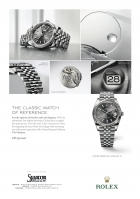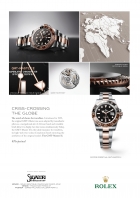ATLANTIS
International Affairs Magazine
Archive
Summer 2014
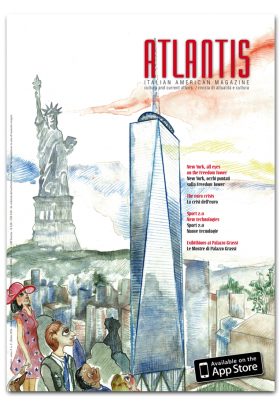
Élite Vs People?
In the short span of about a month were published two interesting books, which have led to at least a few questions and one doubt. The first (in chronological order) is "Governing the Italians, the history of the state" Sabino Cassese, Judge of the Constitutional Court, as well as academic. The second (in all senses) is "Europe or not" by Luigi Zingales, the Italian academic "emigrated" to the Booth School of Business at the University of Chicago. Because, not only the general thrust of their argument, but also some pages look the same even if the argument is addressed by two different points of view: one legal and the other economistic, it is tempting to think that: a) one of the two is the author of plagiarism (hypothesis to be excluded); b) have used the same "ghost writer"; c) attending the same golf club and have overheard the talk each other in the clubhouse; d) it is a coincidence, and their argument comes at a time of reflection, not surprisingly comparative between the formation of the unified Italian state and the European Union. We assume that the answer is d, and both emeritus professors promote it with flying colors. What is the focal point highlighted by the two? The path to the elite in the realization of the two constituent paths and distrust of both the Piedmont and Italian notables in general to the masses, both the elites who have given life to the EU, carefully avoiding subjecting the main steps establishing the ratification of the popular consensus. Both paths, Italian and European, have seen a remarkably limited number of politicians, economists, bankers and entrepreneurs. Not to exceed two percent, census in the first case, perhaps even more limited in the second, whereas Europeans are more than five hundred million. Since the beginning of the two stories, there was no confidence in the people by the rulers and distrust of the elite by the masses. Both paths have created a centralized and bureaucratic institutional design (think of the comparison with the Anglo-Saxon world that does not know the word State) and both have started to an original sin:take over existing debt (perhaps to ingratiate himself with the wealthy poorly digested this solution?), creating a continuity between old and new, and not a moment of departure. Both Risorgimental Italy and European Union have left in the background the political "dream" as a bit 'naive ideal (Mazzini, Cattaneo, Spinelli) and used the realism and cunning (Cavour, Schumann, Adenauer, Delors, Merkel). In the Italian case, faced with the pressure of the discontent caused by the forced annexation of the South, before were sent the "Bersaglieri" in a bloody war of repression then, once ratified an unwritten pact with the ruling classes of the South (which originated, among other things, the disastrous public administration of Borbonic type that the country has even now) was made use of the safety valve of mass emigration. In the European case, in front of Franco-German axis, to lay down the law is the currency that is nothing but a disguised euro mark. And the Government of the Euro, accepted and even desired by the political elites (coincidentally all from the world of academia of economics, central banks or Worlrd financial institutions) that force and "educate" the masses who - according to them - only with the stick of austerity and rigor would accept those reforms that by itself, or democratically, they would never work. Here, then, the rift between the countries of North, virtuous, Reformed, moderate in habits and countries of the South, corrupt, Catholics, lax morals. This in the iconography. While realistically, the comparison is between those who are in a position of competitive advantage and disadvantage of those. The Northern European countries enjoy the deflationary policy operated by the ECB for the benefit of their workers and retirees while the countries of the South, burdened by the weight of their debt and then by the weakness of their banking systems, trudging even in the absence of the ability to reform their public agencies and their backward trade unions mentality. Today, therefore, in Italy, we are located in front of the crux of hundred and fifty years ago. Have the elites reason to be suspicious of the masses who excel at continental level to low level of education (but not by Casati in then this is also a responsibility of the rulers?) or the masses have reason to be wary of the élite? Zingales responds that the exit from the euro, probably only benefit the elite Italian (then and now). Only a New Europe (most liberal, democratic, federal) is an opportunity to break this pattern of secular political hierarchy, crystallization and social immobility. Europe must be seen as a means and not an end. If the goal is economic prosperity and peaceful coexistence, the size of State can help because it reduces the power of local patronage. In Europe then a country (geographically and demographically) large becomes more convenient to use objective selection criteria that encourage meritocracy, reducing corporatism, baronies, familism, mafias . Besides the political corruption that finds fertile ground in the relationship between the state and nell’amoralità widespread citizen deformed by administrative law that puts them on two different floors. What new Europe, then? A new Europe that puts its democracy and human rights in the first place, the market economy and the free exchange of meci workers and the second, a defense and a common foreign policy, third, research, universities and communication common to the fourth. Answering then at the final question of the book “A New Europe”: how will the european citizens of the future be? A citizen who has finally seen asserted its sovereignty in the reconstruction of the rift between the elites and the people. A European who is not a “homogenized political” but a citizen free of choosing and thriving in diversity.
Manifesto for a New Europe
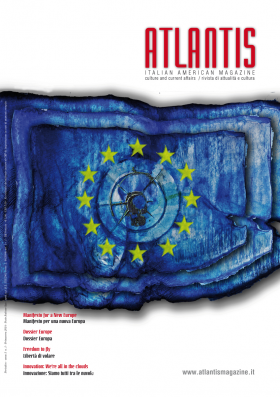
From the European Union to the Europe of the Peoples.
The next May 2014, Italian citizens, along with all their fellow Europeans, they will have to make a choice that , as ever before, will affect the future of Europe and its very existence . The hypothesis that the completion of the process of integration and unification suffer a dangerous braking if not a permanent cessation, it is real and imminent.
The economic crisis of recent years, still not completely overcome, has deeply shaken the economic and social fabric of many countries in Europe, eroding public confidence in political institutions and the European Monetary Union, especially in weaker countries.
Leveraging on the difficulties of families, workers, employers, youth, the unemployed, a current of thought is emerging populist and eurosceptic , putting at risk the achievements and the entire process of building our role in Europe and weakening the geopolitical level . Of course, this European Union is to be reviewed if not completely redone. But it is now clear that without a European institution finally democratic and liberal, the current states are not able to compete. And necessary to engage and to do our part as Europeans and as Italia .
The next European legislature has a fundamental task: to make the reforms that Europe needs to overcome the weaknesses of the current structure and build a new institutional framework necessary for the development and strengthening of the Union, which has a full democratic legitimacy part of all citizens. This requires the combined forces of all citizens -European, liberal reformers , democratic, federalist, a qualified guide and tough at the head of the Commission and Parliament not fragmented.
All this is possible only if you can build a great synergy between European and national parliamentary representatives being aware that the process of development implies that each one operates effectively in their role and in a common and consistent. In this common pathway Italy should be an example to follow and regain the lead propulsion.
We need a serious program and shared by bringing forward o two parallel tracks: the European and national levels. We need to rebuild a liberal and democratic society.
In the new Europe, fundamental freedoms, justice , civil rights , human dignity , personal liberty of the citizen , solidarity, values recognized by the ‘ Charter of Fundamental Rights of the European Union should be concrete implementation through appropriate reforms in all countries. Europe and liberal reformist guarantees safety, real right to privacy and freedom of opinion.
The new liberal Europe must promote economic development through the processes of liberalization of the market of goods and services to consumers at increasingly competitive costs thanks to the transparent mechanism of competition in full compliance with the rules.
Our liberal and reformist Europe will strengthen the increase in the income of the citizens due to the continued economic growth and job creation. Our liberal and reformist Europe look to the future by investing primarily in education and research, technological innovation , environmental sustainability and the development of renewable energy and energy efficiency.
The new Europe will implement liberal and reformist policies that allow and encourage the creation of jobs, fostering entrepreneurship, reducing costs for businesses, making it more flexible, dynamic and accessible labor market. In the new Europe liberal and reformist associations and the third sector will be recognized as an important pillar of a civilized society and play an important role of subsidiarity in the context of personal services as well as a means of easing the costs of the Welfare State.
The new liberal Europe will give a key role to culture, landscape, environment and cultural heritage are unique and should be protected in a harmonious whole.
In the new Europe democratic citizens will feel fully represented by democratically elected institutions through a proper legislative and regulatory decision-making process, and guaranteed by an appropriate electoral law for the formation of the European Parliament. The new democratic Europe produces and provides greater proximity between institutions and citizens through complete transparency of the acts of the various levels of government also ensuring the direct responsibility of the instances involved on a personal level. In the new democratic Europe the rule of law, independence of the judiciary and the role of information, are respected and inviolable.
The new federal Europe will be based on an institutional model that has a strict distinction between the powers of the states and powers of the federation, thus preventing overlap and interference. The federal level has to have specific functions in areas such as Defense, Foreign Policy, Energy, Foreign Trade, Monetary Policy, Labour, the welfare state, telecom, and must protect the identity leaving local autonomy on other matters federated states and their regions, while streamlining the functioning of the various levels of local government on the basis of the criterion of subsidiarity.
The new federal Europe is a political unit able to regain the role of leadership role historically, relevance and prestige at international level.
The new federal Europe will present compact and with a single voice in international forums to which no European country has so singularly significant impact. The common security and defense policy will ensure greater effectiveness of the services rendered.
Europe was born as the cradle of Western Civilization and will return to be in the future world.
December '13 - Jenuary '14
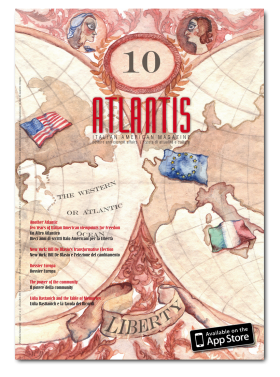
Once upon a time.
Ten years of italian american viewpoints for freedom.
Andrea Mazzanti
Carlo Mazzanti
Once upon a time there was NewYorkCityVenezia, after NYCVE, after again NYC.IT, then Atlantis. It was december 2003, when the first number of the magazine was published, that was defined by ourselves as an italian-american magazine, after a reflection with Professor Anthony Julian Tamburri, director of the John D.Calandra Institute of the New York University, in his office in New York. The magazine’s aim initially was to compare the development and institutional models of the two Northeasts, the American and our Italian.
But soon the goal widened, because the world was rapidly changing. The title was change and then also the goal changed. The lens had now a wider angle.
The magazine no longer did stop neither to the single cities of Venice and New York, nor to the two Northeasts, and turned its eyes to Europe, to the entire American continent and the whole world. It was introduced a final insert called Viewpoint, with the explicit intention of entrusting to the various business and international strategies experts the analysis of international politics and economics. There was, on our part, the knowledge that the so-called globalization entail momentous changes and there was also the fear that the Italian and European ruling class is unable to govern. As you have read, our pieces were anything but submissive to the chorus of acclaim that accompanied the signing of the Treaty of Maastricht before and Lisbon then. The never dissipated fear was and is that this European Union and its single currency were born under an unlucky star. And the international economic crisis that has invested, and no longer leaved us, from 2008 to today, is a testimony that we would have to do more and better.
The globalization of markets and the consequent crisis of the welfare state especially in Europe, without a different policy and no answer by some governments, such as those Italians in recent years, has questioned a report that should be sacred - as it is written in one of the editorials - the one between democracy, capitalism and liberal-constitutional state. Ten years of useless sermons? We would be in company, even after years away, with a liberal so much admired by writers, such as Luigi Einaudi.
After reading many articles - that we have collected in a book published to coincide with this issue of Atlantis and is titled Another Atlantic - it underscores again the relevance. Foresight of the authors or nothing has changed in these ten years of mostly Italian politics? We wanted to subtitle this collection of articles Ten years of Italian-Americans writings for freedom because we do not agree with those who say that the age of ideology is over and now it is necessary to watch with pragmatic if not cynical attitude to politics, administration and the government of things.
These are the ideas that have forever changed the world. The liberal principles are an achievement of Western civilization. Forgetting it would be very dangerous. A fundamental institution such as the European Commission brings together the executive, the legislature and the judiciary powers. Is maybe gone down the Montesquieu principle of separation of state powers? Or is this Europe not to comply with the most basic liberal principles starting from their own institutions? Not to mention the democratic deficit of its other representative bodies.
But the critical spirit has manifested itself much further, calling up our American friends to the respect of their atavistic love of individual freedom increasingly bartered with the thirst for richness belonging to the financial world that has its headquarters on Wall Street. Civil rights are priceless. Ten years have passed. But the battle for freedom is not over.
October - November 2013
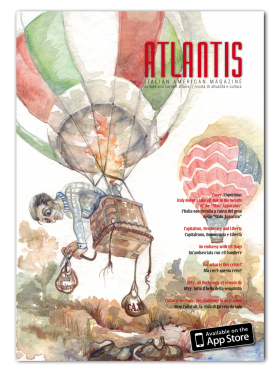
The weight of the "State Apparatus" is holding back the take-off, more or less.
While in the U.S. a parliamentary battle rages for the reduction of spending budget of the state apparatus, even if it means a temporary - but healthy - "shut down", Italy fails to reduce the burden of the cost and inefficiency of the State on the economy and civil society.
Among the other main topics of this issue, politics and current affairs: the editorial by Carlo Mazzanti " Capitalism, Democracy and Freedom"; interview with Arduino Paniccia, Professor of Strategic Studies on "political Europe or decline. But What Europeans want?"; "An embassy with 28 flags" by Alessandro Politi, Director of the NATO Defense College Foundation, Marco Marazzi, Remaking Europe and Alessandra Briganti, a CIME researcher; "But What is this crisis?" Stefania Schipani , "European Dream" by Carlo Mazzanti; "Hyper-Liberistic Lust" by Fabio Scacciavillani; articles on new technologies civilian and military by Roberto Scottini (iOS7 , all the beauty of simplicity) and by Andrea Mazzanti ("Future Soldier" as technological change is transforming the way to fight the soldiers of today and tomorrow); CULTURE: "the winner is: the Holy GRA" by Ferruccio Gard; "Cultural Heritage, the challenge to do it yourself" by Pierluigi Panza; "Maria Mazzotti Gillian: Where I Come From" by Anthony Julian Tamburri Professor and Dean of the" John D. Calandra" Italian American Institute (CUNY); Arianna Cola proposes instead an article about the artist Judy Harvest (A Labour of Love); Save Venice writes about involvement of the Boston Chapter in the restoration of frescoes and monuments of Venice; always to Venice is dedicated the article on Salvadori Jewellry that awarded the winners of the Venetian "Historical Regatta" with two brand new Rolex watches and the creation of a pendant with diamonds for female winners. FOOD: begins a tour of the peninsula in few steps that kicks off with Calabria and his "morseddu".
Happy reading and see you in December, with the number of celebration of our first ten years of life!
________________________________________
The cover of the October-November, work of Laura Monica Costa, illustrates the Italian difficulties in taking off from the quagmire of crisis than U.S. economy is still struggling but already on the road to recovery.
June - September 2013
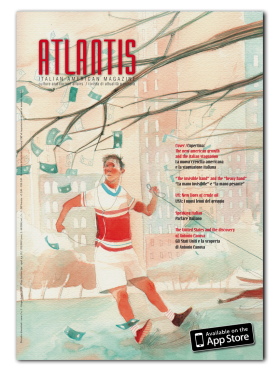
The new american growth and the italian stagnation
The U.S. reacts to the crisis and begin to see the first fruits. The Italian economy continues its race to the bottom, incinerating the opportunities of his immense artistic and cultural heritage, under the suffocating weight of the "State apparatus". Among the main topics of this issue, POLITICS AND CURRENT AFFAIRS: the editorial by Carlo Mazzanti, “The invisible hand” and the “heavy hand”, When the cumbersome presence of the state and of its apparatus defuses the enthusiasm of the free enterprise and the tactical shortsightedness replaces the strategic foresight; "There is no growth without culture", an interview with Giuliano Segre, Professor of Economics and President of the Foundation of Venice; "US: new lions of crude oil", the U.S. and west economic recovery also goes through the new U.S. energy strategy, by Desirè Lucato; "Which butter for which guns?", The real dilemmas about the defence of Europe, by Alessandro Politi, Strategic and Political Analyst, Director of the NATO Defense College Foundation and Marco Marazzi, Secretary General, European Federalist Party; "A brief History of The North Corean Missiles", North Korea began its military missile program well before the fall of the Berlin Wall, by Ennio Savi; "Public funding for parties yes or not?", an innovative solution for Democracy, by Carlo Stagnaro; "You are not the State", when the conflict of interest affects millions of citizens, by Andrea Mazzanti; "Europe: who does she think she is?", an interview with Arduino Paniccia, Professor of Strategic Studies and International Economics at the University of Trieste; "Occhio a Google", rivoluzione o flop? Quello che sappiamo e quello che ci possiamo aspettare dai Google Glass, by Roberto Scottini; "The disease, the care and the healing", Italy out of the proceedings because of the excessive deficit but the dangers have not ended, by Stefania Schipani. CULTURE: "The United States and the discovery of Antonio Canova", A look at the artist’s major works that are preserved in the U.S.A., BY Marco Hubert Campigotto; "A woman manager for the Venetian Museums", Interview to Gabriella Belli, Director of Fondazione Musei Civici of Venice; "A Venetian painter in America", Ludovico de Luigi, a visionary master, by Agostino Buda; "University and Business, a successful union", Interview to Mara Manente, Director of CISET; "Peeta and his hypnotic microcosms", by Arianna Cola; "Speaking Italian", who should or should not, if at all! by Anthony Julian Tamburri, Professor and Dean - John D. Calandra Italian american Institute - Queens College, CUNY; "A Venetian diamond", Monica Pendini, a woman in love with her job. NUTRITION: "Summer: fake light salads", from poor food to a lavish single course, by Alvise Gradenigo; "Wine to Wine", interview to Lucio Gomiero, Winemaker; "Oil to Oil", interview to Daniele Salvagno, presidente of Consorzio di Tutela dell'Olio Extravergine d'Oliva Veneto DOP; "Man and women of wine and territory", one day at lunch at Sabrina Saviolo’s with Giorgio Salvan, by Remo Bevilacqua.
Happy Reading.
________________________________________________________
In this issue, the cover of Veronica Ruffato is dedicated to the new american growth and to italian stagnation. Internal Illustratione of Lara Monica Costa
